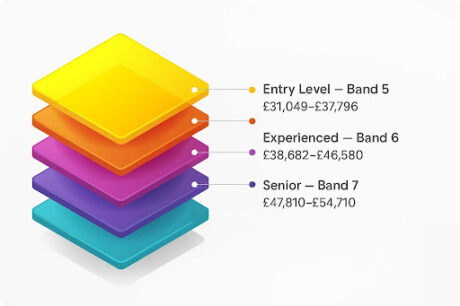No products in the basket.
In the NHS, counsellors usually start on Band 5, earning £31,049–£37,796. With experience, you can move up to Band 6 on £38,682–£46,580. Taking on senior responsibilities may put you at Band 7 on £47,810–£54,710. These figures apply to England from April 2025. That’s the picture if you’re wondering how much do therapists make UK.
Now, private practice feels very different. Outside London, most therapists charge £50–£90 for each session. In London, it’s often £70–£150 or even more. But remember, what you take home depends on how many clients you see, how often people cancel, and the costs of running your practice. Things like room hire, insurance, and supervision all add up.
So, the real answer is this: earnings can look good on paper, but the story changes once life and expenses come in. That’s why many therapists mix NHS work with private clients, to balance stability and freedom.
In this article, we explore how much do therapists make UK. You’ll discover typical pay in the NHS and private practice, why location and experience matter, and how specialist skills can boost your income. By the end, you’ll have a clear picture of therapist earnings and what to expect if you are considering this career.
How much do therapists make UK at entry level?

Band 5: £31,049–£37,796. These jobs usually suit newly qualified counsellors who have just finished training. At this stage, you often work in NHS Talking Therapies or similar local services. Your role focuses on supporting patients with mild to moderate mental health issues. Band 5 is where most counsellors begin their NHS career. You build practical skills, gain confidence, and develop the experience needed for more senior roles.
Progression usually comes with time, extra training, and good feedback from supervisors. Many counsellors move from Band 5 into Band 6 after gaining a few years of experience. This first step sets the foundation for a long career in counselling within the NHS.
How much do therapists make with more experience?
Band 6: £38,682–£46,580. These roles often suit counsellors with several years of practice.
At this level, you usually handle more complex caseloads. You may also support patients with long-term conditions or higher risks. Many counsellors take on added service duties, such as supervising junior staff or helping shape local care pathways. You might also begin to focus on specialist work. For example, you could train in trauma, addiction, or child counselling.
Band 6 marks a clear step up in both responsibility and pay. It shows your growth in skill and professional confidence.
How much do senior therapists make in Band 7?
Band 7: £47,810–£54,710. These posts suit counsellors with strong experience and advanced training.
At this stage, you often take on leadership or supervision duties. You may guide junior staff, trainees, or whole teams. Many Band 7 counsellors specialise in advanced therapies. This might include trauma-focused work, complex mental health, or family interventions. You also carry more service responsibility. You may help design local care strategies, improve services, or manage waiting lists.
Band 7 marks a senior point in the NHS career path. It shows both professional expertise and leadership ability.
Do London therapists make more money in the UK?
Counsellors in London earn extra money called London weighting. This payment adds between 5% and 20% on top of your basic salary.
There are three levels: inner, outer, and fringe London. Each level has set minimum and maximum amounts. Inner London usually gives the highest boost, while fringe areas give the lowest. This allowance helps balance the higher cost of living in the capital. Always check the job advert carefully. It will tell you which London weighting applies to your role.
How much do private therapists make per session?
Outside London, many counsellors charge between £50 and £90 per session. In London, rates often rise to £70–£150 or more.
Experience plays a big part. Senior counsellors or those with specialist skills usually charge near the top of the range. Earnings also depend on bookings. A full diary brings strong income, while cancellations can quickly cut totals. Room hire and online platform costs also matter. These expenses reduce take-home pay, so not every fee becomes profit.
Private practice can offer higher rates than NHS pay. Yet income is less predictable and depends heavily on a steady client flow.
What factors change how much therapists make?
How much do therapists make UK? That question sounds simple, but the truth is a bit more personal. Money in this field does not follow a single chart or rule. Instead, it depends on who you work for, where you live, and even how you shape your career. Let’s start with the NHS. Therapists here often follow clear salary bands. You know what to expect, and you move up as you gain experience. That structure feels steady and safe, but it can also feel limiting if you dream of higher earnings.
Private practice tells a very different story. Some therapists set their own fees and charge between £50 and £100 for each session. In London and other costly areas, sessions can jump to £150 or more. This freedom gives you a chance to earn more, but it also means you must handle the stress of finding clients and running a business. Location also plays a huge role. A therapist in a busy city may earn far more than someone in a small town. Of course, big cities bring higher rent and daily costs, so the extra money often goes straight back out.
Finally, your special skills can boost your pay. If you train in areas like trauma, child therapy, or CBT, clients may be willing to pay more for that knowledge. So yes, numbers matter. But at the end of the day, your choices, your energy, and your path make the biggest difference.
How much do Counsellors in the UK make today?
Most NHS counsellor jobs sit between Band 5 and Band 7. The band you start on depends on your role and experience.
- Band 5 (entry level): Salaries range from £31,048 to £37,796. These roles often suit newly qualified counsellors starting their NHS career.
- Band 6 (mid level): Salaries rise to £38,682–£46,580. At this stage, you usually take on more responsibility and may supervise others.
- Band 7 (experienced): Salaries reach £47,810–£54,710. These posts often require advanced skills or specialist training. Many counsellors aim for this level after several years.
- Higher bands: Some senior or lead roles move into Bands 8a and 8b. Pay here can reach £55,690–£74,896. Consultant-level posts may earn even more.
London weighting adds extra money on top of the base salary. The exact amount depends on whether you work in inner, outer, or fringe London. These figures apply to England for 2025/26. Pay in Scotland, Wales, and Northern Ireland may follow slightly different scales.
How do NHS job ads show how much therapists make?

On NHS Employers, you can see the full 2025/26 NHS pay scales. These show clear salary bands for all staff, including counsellors.
Health Careers explains what each counselling role involves and which band level it sits at. This helps you see where you might start and how you can move up.
For private practice, it is best to read a current therapy fees guide. These explain how much counsellors charge across the UK and how London fees differ. You can also find notes on factors like room hire, online sessions, and cancellations.
Reading an NHS Job Ad (Fast)
The trick is learning how to read the ad quickly. Four little clues usually tell you the whole pay story.
First, always check the band. This number links straight back to the NHS pay scales, so you know the exact salary range. Next, notice the hours. Full-time and part-time roles pay very differently, and it’s easy to miss that detail if you skim.
Then, look at the location. Some ads in London or other costly areas include extra “weighting” money on top of your base salary. It may sound small, but it really adds up month after month.
Finally, check for specialist skills in the job description. If a role asks for training in CBT, family therapy, or trauma work, it often sits in a higher band. That means better pay right from the start.
Once you get used to spotting these four points, NHS ads feel less confusing. Instead of guessing or worrying, you can quickly see if a role matches your needs. And that gives you more control and confidence as you plan your next step.
Private Work – The Quiet Costs
When people ask how much do therapists make UK in private practice, the session fees can look high. But remember, not all of that money is yours to keep. Some of it goes back into running your work.
Here are the main costs:
- Room hire – you often pay to use a safe, quiet space.
- Supervision – you meet a senior therapist to check your work stays safe.
- Insurance – this protects you and your clients in case something goes wrong.
- CPD (extra training) – workshops and courses help you grow and stay skilled.
At first, these costs might feel a bit much. But they are normal and they keep your work safe, trusted, and professional. Therapy Central points out that private practice brings freedom, but you must balance the money side.
So, when you set your fee, remember it covers more than just one hour with a client. It also covers the care, safety, and training that make you a therapist people can count on.
Private Practice / Non-NHS Earnings
Private work is less standardised. Earnings depend on fee per session, number of clients, overheads (room hire, insurance, etc.), and how many hours you work.
Here are typical session fee ranges:
- Outside London : many therapists charge £40-£90 per session.
- London & high-cost areas: session fees often sit £70-£150+ depending on experience & setting.
In some sources, average annual income in private work (once you subtract costs) for a therapist with a reasonable caseload is estimated in the mid-£30,000s (e.g. one figure ~£34,988) but this can swing much higher.
How can therapists increase how much they make?
If you want to grow your income, focus on a few smart steps.
- Develop a specialism: Skills in trauma, couples therapy, or children’s work can set you apart. Clients often pay more for focused expertise.
- Add supervision or lead responsibilities: Taking on trainee support or team leadership can move you into higher NHS bands. It also strengthens your long-term career.
- Consider London or hotspot roles: Jobs in inner or outer London, or in high-demand areas, bring weighting on top of your salary. That can mean thousands more each year.
- Refine private practice policies: Set clear rules on cancellations and late payments. A fair but firm approach protects your income and reduces stress.
- Keep building skills: Regular CPD and new training expand your options. More skills mean more ways to earn.
FAQ: How Much Do Therapists Make UK?
- How much do therapists get paid in the UK?
In the UK, therapists earn £25,000–£39,000 at entry level and £47,000–£55,000 with experience. NHS psychotherapists make £47,810–£54,710, while private fees range £55–£100 per session.
- Is it hard to become a therapist in the UK?
Becoming a therapist in the UK is very competitive. Placements are limited, and opportunities often depend more on connections than knowledge.
- What GCSE do I need to be a therapist?
To become a therapist, you need at least five GCSEs at grade 4/C or above, including English and Maths. A psychology degree is often required, and subjects like Psychology, Biology, and Sociology are especially helpful.
- How much does an NHS therapist get paid?
NHS psychotherapists earn £47,810–£54,710 at Band 7, with senior roles (Bands 8a–8b) paying up to £74,896.
- Are therapists in demand in the UK?
More people are seeking therapy across healthcare, education, and workplaces, creating new jobs and growth.
Final Thoughts
So, how much do therapists make UK? Earnings depend on NHS bands, private fees, and your own choices. Experience, skills, and location all shape income. Yet, therapy is more than pay—it’s about helping people grow. If you find balance between money and meaning, this career can be deeply rewarding.
Take the Next Step in Your Counselling Career
If you want to learn real, proven tools in therapy, check out the Cognitive Behavioural Therapy and Introduction to Psychotherapy course from Wise Campus. It could be the key step to raising your fees, helping more clients, and feeling proud of your progress.




